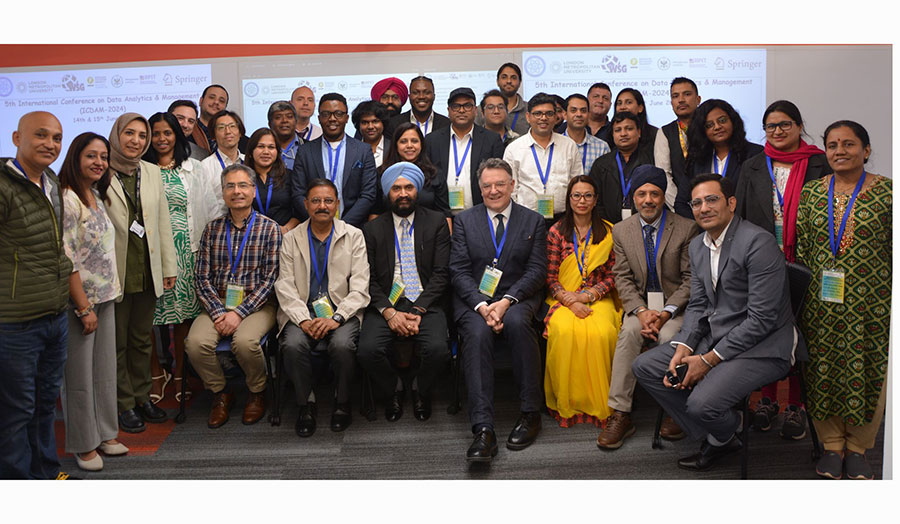Apply for this course
Please select when you would like to start:
Use the apply button to begin your application.
If you require a Student visa and wish to study a postgraduate course on a part-time basis, please read our how to apply information for international students to ensure you have all the details you need about the application process.
Why study this course?
On our Data Analytics MSc you'll dive into vital subjects including data mining, statistical modelling, business intelligence and data visualisation. The course has been developed with direct input from industry experts who know the value of learning through real-life business cases. By the end of the master's degree you’ll be ready to apply for rewarding roles in the data science and big data industries, as well as the many sectors and organisations that increasingly require data analysts.
Our Data Analytics MSc degree has been accredited with partial CITP status by BCS, The Chartered Institute for IT. This accreditation is a mark of assurance that the degree meets the standards set by BCS. As a graduate of this course, accreditation will also entitle you to professional membership of BCS, which is an important part of the criteria for achieving Chartered IT Professional (CITP) status through the Institute.
The course has also achieved partial CENG status by BCS on behalf of the Engineering Council. Accreditation is a mark of assurance that the degree meets the standards set by the Engineering Council in the UK Standard for Professional Engineering Competence (UK-SPEC). An accredited degree will provide you with some or all of the underpinning knowledge, understanding and skills for eventual registration as an Incorporated (IEng) or Chartered Engineer (CEng).
Some employers recruit preferentially from accredited degrees, and an accredited degree is likely to be recognised by other countries that are signatories to international accords.
The course can also prepare you for the industry-recognised Oracle Professional Certification.
Accredited by the BCS
This course has been accredited with partial CITP status by BCS, The Chartered Institute for IT
Accredited by the Engineering Council
The course has also achieved partial CENG status by BCS on behalf of the Engineering Council - this is a mark of assurance that the degree meets the standards set by the Engineering Council in the UK Standard for Professional Engineering Competence (UK-SPEC)
Become a member of the BCS
As a graduate of this course you will be entitled to professional membership of the British Computer Society (BCS), which is an important part of the criteria for achieving Chartered IT Professional (CITP) status through the Institute
Course modules
The modules listed below are for the academic year 2024/25 and represent the course modules at this time. Modules and module details (including, but not limited to, location and time) are subject to change over time.
Year modules
Data Analysis and Visualization
This module currently runs:autumn semester - Thursday afternoon
(core, 20 credits)
This module explores fundamental concepts for analysing and visualising data. The module covers descriptive statistics for exploratory data analysis, correlation analysis and linear regression model. Graph and text data analysing techniques for web and big data and reporting the results and presenting the data with visualisation techniques are also discussed. A substantial practical element is integrated into the module to enable students to apply data analysis and visualisation techniques for real world data analytical problems.
The aims of this module are to:
• enable students to gain understanding of fundamental concepts in data analysis and visualisation,
• develop students expertise in data analysis with descriptive statistics, correlation analysis, and linear regression model,
• enable students to acquire knowledge of graph and text data analysing, and
• develop students with practical skills in applying data analysis and visualisation techniques for real world data analytical problems.
Data Mining and Machine Learning
This module currently runs:spring semester - Thursday morning
summer studies - Tuesday afternoon
summer studies - Tuesday morning
(core, 20 credits)
This module provides an appreciation of data mining and machine learning fundamental concepts, algorithms, and process. It covers machine learning algorithms and data mining techniques for data analysis, pattern mining, clustering, classification and regression. It equips the students with practical skills in applying data mining and machine learning techniques in real-world analytics problems.
The aims of this module are to:
• provide students with an understanding of data mining and machine learning fundamental concepts, algorithms, and process.
• understand the purpose and breadth of areas of application of data mining and machine learning
• understand and compare the techniques and tools available for various type of data analytics problems
• develop students with practical skills in applying data mining techniques to solve real-world analytics problems.
Data Warehousing and Big Data
This module currently runs:autumn semester - Thursday morning
autumn semester - Thursday afternoon
(core, 20 credits)
The module aims to strengthen your skills in data technologies ranging from database and data warehousing to Big Data. First, it will provide you with good understanding of database concepts and database management systems in reference to modern enterprise-level database development. Once gaining good skills in database development, you will be able to study and gain an in-depth understanding of data warehousing which include concepts and analytical foundations as well as data warehousing development. Through intensive hands-on sessions, you will be able to get familiar with related technological trends and development in the field. The module will leverage a portfolio of SQL server tools such as, SQL Server Management Studio (SSMS) and Azure Data Studio, to provide hands-on experience in implementing a reporting solution through a combination of assignments and lab exercises.
The module introduces also the foundation of Big data management based on Apache Hadoop platform and provides you with a broad introduction to Big Data technologies. This will involve hands-on sessions, designed for data analysts, business intelligence specialists, developers, administrators, or anyone who has a desire to learn how to process and manage massive and complex data to infer knowledge from data. Topics include Hadoop, HDFS, MapReduce using tools such as Hive, Pig and Zeppelin for hands-on experience.
Financial Mathematics
This module currently runs:autumn semester - Wednesday afternoon
(core, 20 credits)
This module provides an introduction to some of the key mathematical methods used in financial calculations and how they are applied to the valuation of projects in the presence of uncertainty. There will be a particular focus on Discounted Cash Flow and Real Options methods but also on recent developments in the field of project valuation.
Methods such as Monte-Carlo simulation for financial options valuation and the Capital Asset Pricing Model (CAPM) with the aim of optimising a portfolio will also be explored using real financial data.
The module aims to:
1. Provide students with a set of up-to-date mathematical tools for project valuation with a particular focus on financial applications.
2. Provide a foundation in modern developments in optimisation theory and methods and introduce essential topics of unconstrained and constrained optimisation.
3. Explore the applications of Capital Asset Pricing models to problems involving decision making in modern portfolio management using real world financial data
Read full detailsMSc Project
This module currently runs:summer studies - Wednesday afternoon
autumn semester - Wednesday afternoon
spring semester - Wednesday afternoon
(core, 60 credits)
The module provides students with the experience of planning and bringing to fruition a major piece of individual work. Also, the module aims to encourage and reward individual inventiveness and application of effort through working on research or company/local government projects. The project is an exercise that may take a variety of forms depending on the nature of the project and the subject area. Particular students will be encouraged to carry out their projects for local companies or government departments.
Semester: Autumn/Spring/Summer
Prerequisites: all course specific core modules
Assessment: 100% coursework (project viva is compulsory for all students)
Prior knowledge: Understanding of research management, planning and LSEP issues
The module aims to encourage and reward individual inventiveness and application of effort. It also aims to allow students:
- To have an opportunity to assimilate the knowledge they gained in their course and extend this knowledge to new area of application.
- To apply newly acquired knowledge and techniques to a specific problem using established research techniques and methods.
- To determine the framework of the project according to a set of specifications relevant to the subject of study.
- To manage an extended piece of work by confining the problem within the constraints of time and available resources.
- To research effectively the background material on the topic using a variety of sources and to develop ability to conduct critical analysis and draw conclusions.
- To develop the ability to produce detailed specifications and design frameworks relevant to the problem of investigation in the subject related to the industry.
- To demonstrate the originality in the application of new knowledge and skills.
- To effectively communicate the work to others by means of verbal and appropriate documentation techniques.
- To raise awareness in potential business development opportunities in an area pertinent to the topic.
Programming for Data Analytics
This module currently runs:summer studies - Monday morning
summer studies - Monday afternoon
spring semester - Thursday afternoon
(core, 20 credits)
This module develops students’ foundation of programming principles through the introduction of application programming for data analytics. The module covers common programming data structures, flow controls, data input and output, and error handling. In particular, the module places emphasis on data manipulation and presentation for data analysis. A substantial practical element is integrated into the module to enable students to use a programming language (e.g. Python) to prepare data for analysis and develop data analytical applications.
The aims of this module are to:
• enable students to gain understanding of programming principles,
• develop students’ knowledge and skills in programming design and coding,
• develop students expertise in data manipulation and presentation for data analysis,
• develop students with practical skills in data analytical applications development, and
• enhance students skills for integrative reasoning, problem-solving and critical thinking.
Statistical Modelling and Forecasting
This module currently runs:summer studies - Tuesday afternoon
spring semester - Wednesday afternoon
summer studies - Wednesday afternoon
(core, 20 credits)
This module will introduce students to modern statistical modelling techniques and how those techniques can be used for prediction and forecasting. Throughout the statistical environment and software R will be used in conjunction with relevant statistical libraries.
The module will, introduce modern regression techniques (including smoothing), discuss different model selection techniques (including the classical statistical hypothesis) and how those techniques can be used for prediction purpose.
Prior learning: Statistical knowledge desirable.
The module aims to:
1. Equip graduate students with modern statistical techniques
2. Provide students with some selected advanced statistics topics including forecasting
3. Prepare students to be able to read and understand professional articles
4. Prepare students to carry on their own research and use modern statistical techniques as one of the tools for their research.











.jpg)
.jpg)
.jpg)
.jpg)




